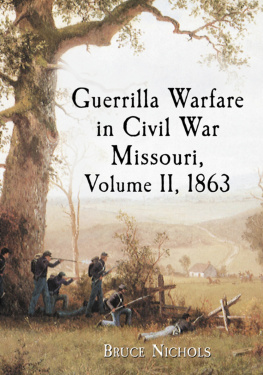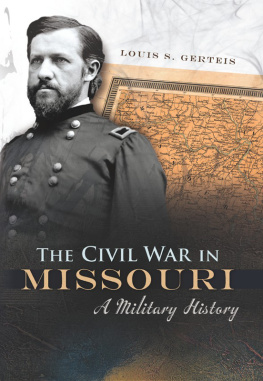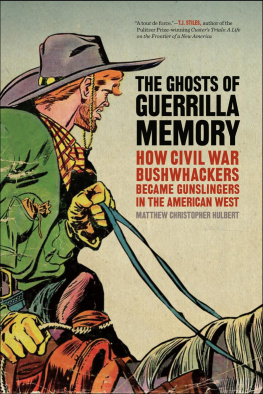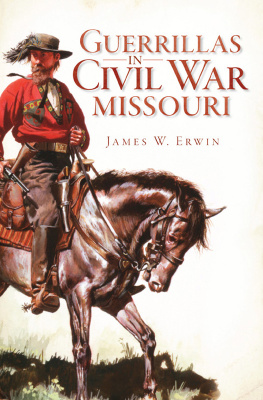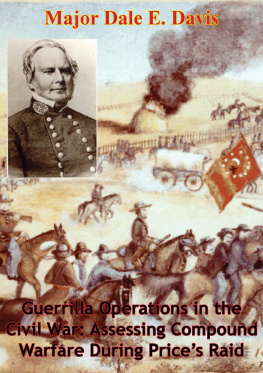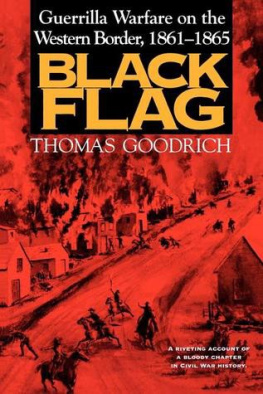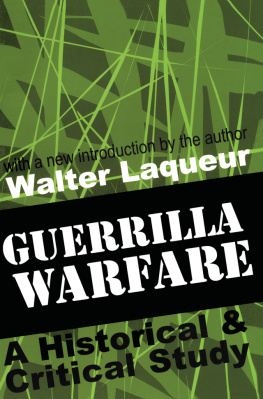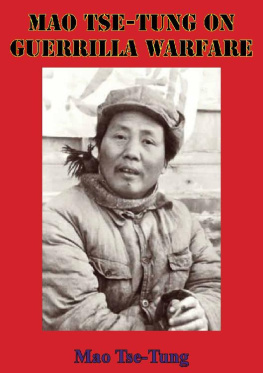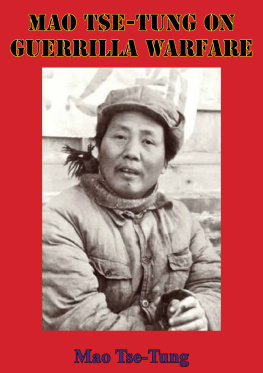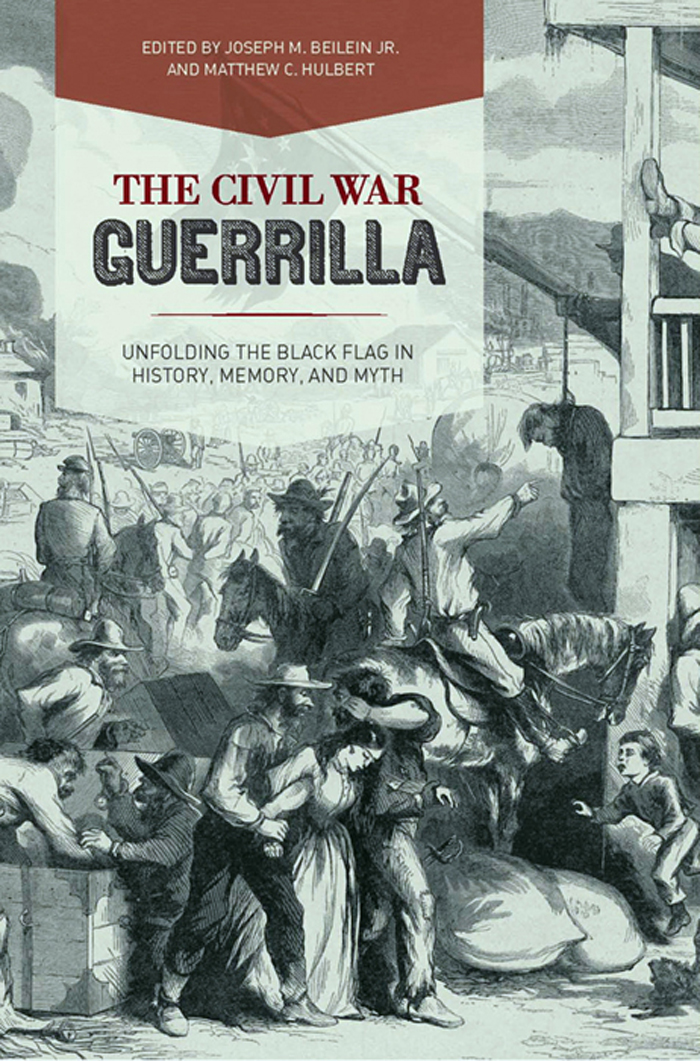The Civil War Guerrilla
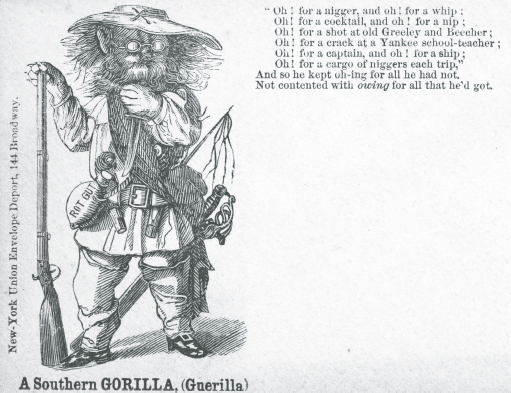
The
Civil War
Guerrilla
Unfolding the Black Flag
in History, Memory, and Myth
Edited by
Joseph M. Beilein Jr.
and
Matthew C. Hulbert

Due to variations in the technical specifications of different electronic reading devices, some elements of this ebook may not appear as they do in the print edition. Readers are encouraged to experiment with user settings for optimum results.
Copyright 2015 by The University Press of Kentucky
Scholarly publisher for the Commonwealth,
serving Bellarmine University, Berea College, Centre College of Kentucky, Eastern Kentucky University, The Filson Historical Society, Georgetown College, Kentucky Historical Society, Kentucky State University, Morehead State University, Murray State University, Northern Kentucky University, Transylvania University, University of Kentucky, University of Louisville, and Western Kentucky University.
All rights reserved.
Editorial and Sales Offices: The University Press of Kentucky
663 South Limestone Street, Lexington, Kentucky 40508-4008
www.kentuckypress.com
Frontispiece: A Southern Gorilla (Guerilla). (Library of Congress, Prints and Photographs Catalog)
Library of Congress Cataloging-in-Publication Data
The Civil War guerrilla : unfolding the black flag in history, memory, and myth / edited by Joseph M. Beilein Jr. and Matthew C. Hulbert.
pages cm. (New directions in Southern history)
Includes index.
ISBN 978-0-8131-6532-5 (hardcover : alk. paper) ISBN 978-0-8131-6534-9 (pdf)
ISBN 978-0-8131-6533-2 (epub)
1. United StatesHistoryCivil War, 1861-1865Underground movements. 2. Guerrilla warfareUnited StatesHistory19th century. 3. Guerrillas United StatesHistory19th century. I. Beilein, Joseph M., Jr., editor, author. II. Hulbert, Matthew C., editor, author.
E470.C594 2015
973.73dc23
2014043439
This book is printed on acid-free paper meeting
the requirements of the American National Standard
for Permanence in Paper for Printed Library Materials.

Manufactured in the United States of America.

Member of the Association of
American University Presses
Contents
Christopher Phillips
Joseph M. Beilein Jr. and Matthew C. Hulbert
Christopher Phillips
Andrew William Fialka
David Brown and Patrick J. Doyle
Megan Kate Nelson
Matthew C. Hulbert
John C. Inscoe
Rod Andrew Jr.
Joseph M. Beilein Jr.
Victoria E. Bynum
Foreword
Inside Fellmans War
Christopher Phillips
War is hell and people are shits. Such was my first introduction to my longtime friend Michael Fellman.
The year 1991 was a heady one for me, a published yet unminted PhD student of southern history finishing my dissertation while teaching fulltime as an instructor at the University of Georgia. My first book had been issued the previous year, a study of a controversial federal army commander in a slave stateMissouribarely linked in prevailing scholarship either to southern history or to the Civil Wars metanarrative. Born as an MA thesis, the books contention was that Nathaniel Lyons rash actions in 1861 in this ostensibly neutral state helped to precipitate a chaotic, internecine conflict there by shifting fragile allegiances of innumerable hitherto-moderate Missourians, especially in rural areas, away from the federal government. The book was put into production in the summer of 1989 and published the following springtoo late, as it turned out, to consider Michaels magisterial Inside War: The Guerrilla Conflict in Missouri during the American Civil War, released by Oxford University Press in May 1989. His book not only established Michaels stature as a leading Civil War historian but launched a new genre of Civil War writingwar studies, which integrated civilians into the realm of military history. More, it redefined the history of the Civil War in Missouri and, to some degree, elsewhere. Unexpectedly, it linked Michaels book and mine and sparked a friendship that would last well over two decades.
My introduction to Michael came that fall at a conference in Springfield, Missouri, where, improbably, I presented on the plenary panel alongside Michael and Jim McPherson, whose Battle Cry of Freedom had received the Pulitzer Prize in 1988. Midwesterners all, our session served as my introduction to the full-contact sport known as academia. Both Michael and Jim had recently reviewed my book in prominent journals and had fully articulated their criticisms of it. Predictably, Jim questioned my notions of Lyons personalized motivations over any ideological impetus while Michael targeted my insertion of Lyon into the origins of Missouris inside war. His understanding of irregular warfare located it as the truest and fullest expression of the human stainsavagery lying just beneath the veneer of civilized codes of conduct, whether social or personal. Because guerrilla warfare is unregulated and violates nearly all the self-styled laws of war (in fact, during the American Civil War, it led directly to the first-ever written form of such law in the United States, namely the Lieber Code), such violence provides a mirror into human nature and only confirms Michaels view of war as the exemplar of mans inhumanity to man. Fittingly, Michaels guerrilla war in Missouri was nihilistic, sociopathic, Manichean, and fully immoral. His lodestar, as he stated at the conference and then often afterward, was Americas war with Vietnam, the foreign conflict and domestic counterconflict that had shaped his beliefs while a student at the University of Michigan and Northwestern University in the late 1960s. A long academic career at Simon Fraser University in Vancouver, Canadaseeing clearly from clear across the border, as he put itdeepened his sense of America as a tragic nation of glittering abstractions whose residents perpetually nave idealism convince them that their country is exceptional.
Michaels principal complaint with my book was that no single act, or actor, could have initiated such a brutal conflict as raged in Missouri from 1861 to 1865. Indeed, it emanated from the depth and breadth and height of depravity, the human soul requiring no spark to enflame other than the presence of war itself. His view of warand of menled him both inevitably and rightly to rewrite the prevailing narrative of guerrillas not as cryptoheroes or warrior chieftains but as common people, farmers, neighbors, and even friends, who behaved only slightly less commonly under the duress of uncivil war. Inside War taught that, under such pressure, all of us are guerrillasor easily could be.
Similarly, Michaels reviews, not only of my book but of those of many others, conformed to his view that although war is never binary, individualized warfare must be so. Thus his reviews were often warlikecombative, biting, often brilliant, and always trenchant and honest. Similarly, his disagreements with historians whose interpretations differed from hisor who differed with his interpretationswere epically ad hominem. I suffered the lash after blurbing T. J. Stiless fine book on Jesse James, which he appreciated, although he was largely unconvinced by its argument for the politics of slavery rather than personal pathology as underpinning Missouris inside war and catalyzing its most iconic inside warrior. Yet, near the end of his life, during a long phone conversation about my latest book manuscript, on the long and expansive border war (which he read in draft in its entirety, offering an essential critique that cued its successful revision), he conceded privately the possibility of an ideological dimension and even basis for guerrilla warfare.


